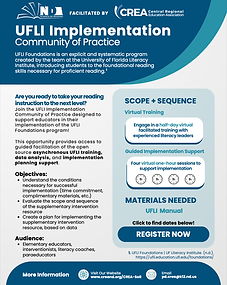
CREA Science of Reading
Our Approach
The science of reading is a vast body of scientific evidence that describes how people learn to read. It draws from multiple fields, including education, linguistics, cognitive psychology, special education, and neuroscience. Understanding how brains typically process sound and print to read helps educators understand efficient, explicit instructional methods which are proven to work. Knowledge of the science of reading guides decisions about instruction when students aren’t learning to read.
CREA partners with the ND Department of Public Instruction and other Regional Education Associations (REA) to provide educators with evidence-based, multi-disciplinary professional learning.
Learn more by viewing the flowchart on this page, and browse our opportunities below!
Professional Learning Opportunities
MEETS NDCC 15.1-21-12.1 REQUIREMENTS
Foundations of Reading: Instruction & Intervention
This three-part learning series is designed to provide educators with the knowledge, skills, and tools necessary to address a variety of students’ needs in reading, targeting the five Big Ideas of Reading ((phonological awareness, phonics, fluency, comprehension and vocabulary)
Supporting Secondary Struggling Readers
Learn how to assist struggling readers at the secondary level through concentrating on 3 essential elements: curriculum, instruction-, and assessment. A large portion of the course will be spent diagnosing student reading needs and how to match those needs with appropriate instructional strategies.
IMPLEMENTATION SUPPORTS
OTHER NDSOR OFFERINGS

EVENTS
SELF-PACED COURSE!
The sold-out 2024 ND Literacy Summit is now available on-demand in the ND Educational Hub! This asynchronous course features recordings from 10 national and regional literacy experts, as well as North Dakota educators sharing their journeys in implementing the Science of Reading.
Course Highlights:
-
Full access to summit recordings for individual or team learning
-
Facilitator Guides: Perfect for administrators and literacy leaders to lead local professional learning sessions.
-
Graduate Credit: Available to all registered educators through VCSU upon completion of requirements (additional fee applies).
"So well done -- thank you for a national level conference right here in ND. We appreciate everyone's dedication to the event and our mission!"
"Amazing event! The lineup of presenters was phenomenal. I went away feeling inspired to make changes and empowered in knowing how to do them!"
"I feel so invigorated and excited to go back to my classroom next year and DO BETTER for my students!"
"This was one of the most organized events! It was run smoothly, had top notch presenters, and was held at a perfect venue. Every detail was appreciated!"






















.png)

